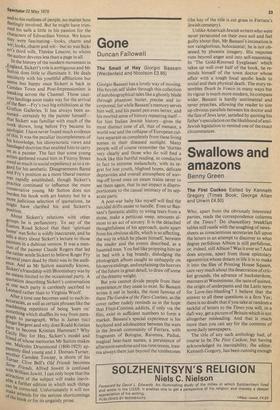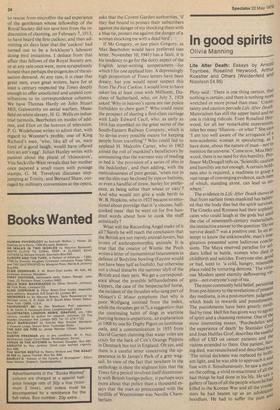Swallows and amazons
Benny Green The First Cuckoo Edited by Kenneth Gregory (Times Book; George Allen and Unwin £4.50) Who, apart from the obviously interested parties, reads the correspondence columns of the Times? Do chancellory breakfast tables still rustle with the soughing of newssheets as conscientious secretaries fall upon the letters in an attempt to discover to what degree perfidious Albion is still perfidious, or, indeed, still Albion ? Was it ever so ? And does anyone, apart from those epistolary egocentrics whose dream in life it is to make it into the files of Printing House Square, care very much about the desecration of cricket grounds, the advance of hucksterdom, manners at Westminster, the taste of quince, the origin of underpants and the Latin term for Love-lies-bleeding? I believe that the answer to all these questions is a firm Yes; there is no doubt that if you take at random a sackful of letters to the Times you will, in a daft way, get a picture of Britain which is not altogether misleading. And that is much more than you can say for the contents of some daily newspapers.
The title of any such anthology had, of course to be The First Cuckoo, but having acknowledged its inevitability, the editor, Kenneth Gregory, has been cunning enough
to rescue from microfilm the sad experience of the gentleman whose fellowship of the Royal Society did not save him from the indiscretion of claiming, on February 7, 1913, to have heard the first cuckoo, and then admitting six days later that the 'cuckoo' had turned out to be a bricklayer's labourer doing bird imitations. I deduce from that affair that fellows of the Royal Society are, or at any rate once were, more scrupulously honest than perhaps the exigencies of the situation demand. At any rate, it is clear that great men, even great writers, have for at least a century respected the Times deeply enough to offer unsolicited and unpaid contributions to its correspondence columns. We have Thomas Hardy on John Stuart Mill, Galsworthy on aerial warfare, Masefield on white slavery, H. G. Wells on industrial turmoils, Beerbohm on modes of address, and Eliot on the horrors of television. P. G. Wodehouse writes to admit that, with regard to Wooster's profile, one of King Richard's men, 'who, like all of us, were fond of a good laugh, would have offered him an ant's egg'. Julian Huxley writes with passion about the plural of 'rhinoceros', Vita Sackville-West reveals that her mother once papered a small room with postage stamps, G. M. Trevelyan discusses stepjumping at Trinity, and Bernard Shaw, outraged by millinery conventions at the opera, asks that the Covent Garden authorities, `if they feel bound to protect their subscribers against the danger of my shocking them with a blue tie, protect me against the danger of a woman shocking me with a dead bird'.
If Mr Gregory, or just plain Gregory, as Max Beerbohm would have preferred (see letter, November 10, 1941) has a fault, it is his tendency to go for the dotty aspect of the English letter-writing temperament—for which I for one applaud him. A depressingly high proportion of Times letters have been dreary, but you would never suspect this from The First Cuckoo. I would love to have taken tea at least once with Millicent, Duchess of Sutherland, who, on July 5, 1928 asked 'Why in heaven's name are our police forbidden to chew gum ?' Who could resist the prospect of sharing a first-class carriage with Lady Edward Cecil, who, as early as 1916 has stumbled on the great secret of the South-Eastern Railway Company, which is 'to devise every possible means for keeping people from travelling' ? Who could fail to applaud H. Malcolm Carter, who in 1962 joined the roll of mankind's benefactors by announcing that the warmest way of reading in bed is 'the provision of a series of slits in the bedclothes', and then adding, with the meticulousness of pure genius, 'when not in use the slits may be closed by zips or buttons, or even a handful of straw, barley for preference, as being softer than wheat or oats'? And who would not give a wide berth to W. B. Hopkins, who in 1925 became so emotional about porridge that is 'a viscous, halfcooked mess' that he went on for five hundred words about how to cook the stuff artistically ?
What will the Recording Angel make of it all? Surely he will reach the conclusion that the British are not merely animal-lovers, but lovers of anthropomorphic animals. It is true that the creator of Winnie the Pooh writes a letter of monumental fatuousness in defence of Bodyline bowling (Eeyore would not have been half as foolish), but otherwise not a cloud disturbs the summer idyll of the British and their pets. W.e get a correspondence about the possible lefthandedness of kippers, the case of the bespectacled horse, the incident of the thrushes who sang part of Mozart's G Minor symphony (but why is poor Wolfgang omitted from the index, while the thrushes get in ?), a suggestion that the continuing habit of dogs in wartime , burying bones is unpatriotic, an explanation in 1908 by one Sir Digby Pigott on luminous owls, and a communication in 1955 from David Garnett claiming that water voles are crazy for the bark of Cox's Orange Pippins in Denmark but not in England. Oh yes, and there is a careful letter concerning the appearance in St James's Park of a grey wag tail. In view of the fact that nowhere in the anthology is there the slightest hint that the Times for a period involved itself disastrous ly with British foreign policy, it perhaps says more about that policy than a thousand essays that the man so preoccupied with the birdlife of Westminster was Neville Chamberlain.



































 Previous page
Previous page